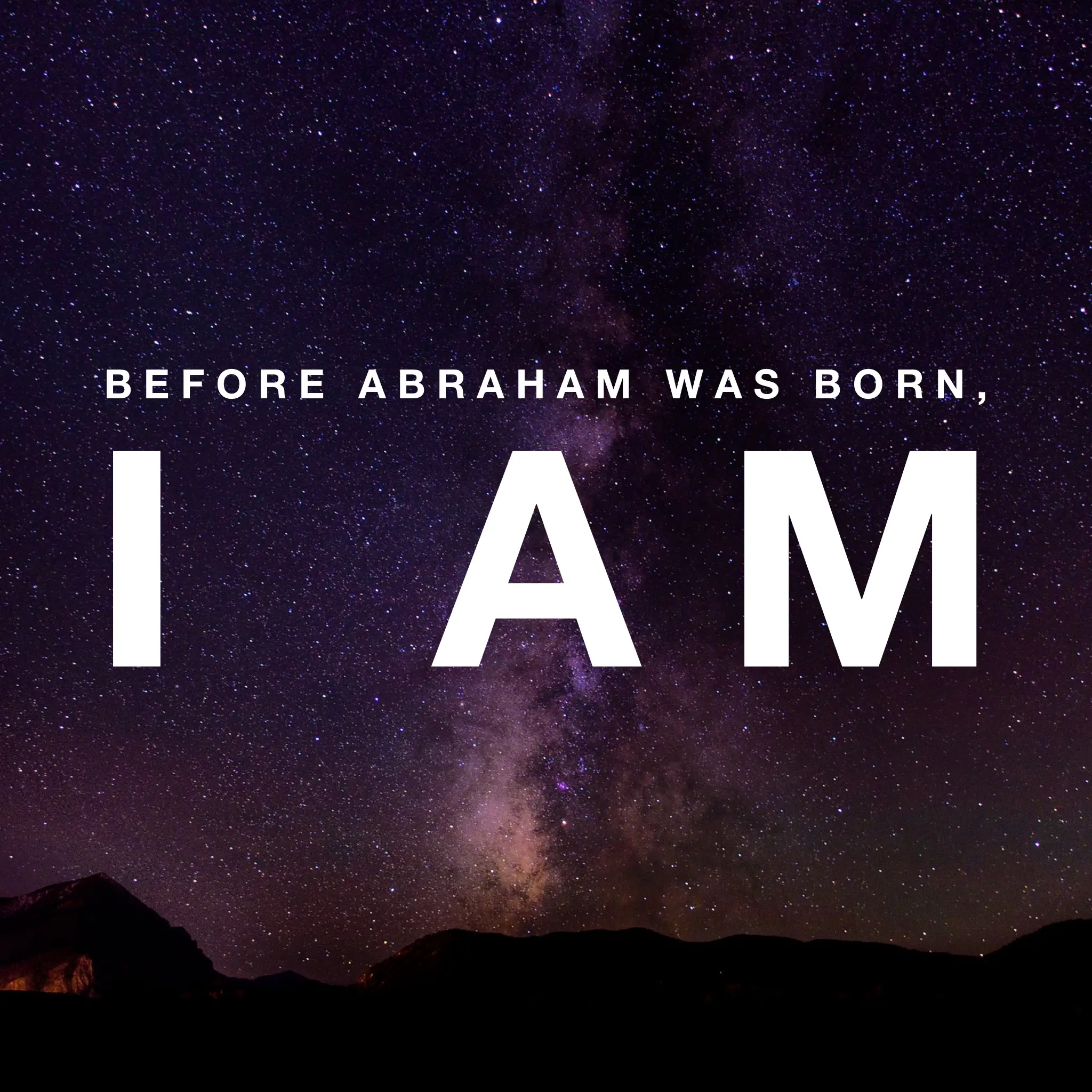At the climax of a rather heated exchange between Jesus and certain antagonistic Jews, Jesus uttered what has become for some, a proof text of his preexistence in heaven as God.
John 8:58-59 (NASB) Jesus said to them, “Truly, truly, I say to you, before Abraham was born, I am.” 59 Therefore they picked up stones to throw at Him, but Jesus hid Himself and went out of the temple. (emphasis added)
When the above passage is read, especially without the preceding context, it appears the Jews want to kill Jesus because he claimed to be the “I AM” of the Old Testament.
Exodus 3:14 (NASB) God said to Moses, “I AM WHO I AM.”
But as we will soon see, this is not at all what Jesus was saying.
 The phrase “I am” in the Greek is ego eimi: I (ego) am (eimi). HELP Word Studies says eimi is the basic Greek verb which expresses being. It’s what we refer to in English as a “be verb.” The phrase ego eimi is not a name, nor an identity. If someone were to come up to a man named Bill and ask, “Who are you?” he would respond, “I am (ego eimi ) Bill.” His name is not “I am,” his name is Bill. Or if someone were to ask him, “Are you Bill?” He would respond, “I am (ego eimi) or “I am (ego eimi) Bill.
The phrase “I am” in the Greek is ego eimi: I (ego) am (eimi). HELP Word Studies says eimi is the basic Greek verb which expresses being. It’s what we refer to in English as a “be verb.” The phrase ego eimi is not a name, nor an identity. If someone were to come up to a man named Bill and ask, “Who are you?” he would respond, “I am (ego eimi ) Bill.” His name is not “I am,” his name is Bill. Or if someone were to ask him, “Are you Bill?” He would respond, “I am (ego eimi) or “I am (ego eimi) Bill.
The phrase ego eimi is used almost 300 times in the New Testament. For example, when Jesus healed a man who had been born blind, some recognized the miracle that had occurred, while others were saying it wasn’t the same man. However, the man whose sight had been restored kept insisting that he was the one:
John 9:9 (NASB) Others were saying, “This is he,” still others were saying, “No, but he is like him.” He kept saying, “I am [ego eimi] the one.” (emphasis added)
In the Greek it says that the man kept insisting, “ego eimi,” that its “I am.” The translators added the phrase “the one” so it would make better sense in English, otherwise the sentence would be awkward. The context surrounding an ego eimi statement determines what words should be added in English. Sometimes translators will italicize the added words, however, in this case they did not. Another example of where the translators added words to an ego eimi statement is when Jesus was speaking to a Samaritan woman:
John 4:23-26 (NASB) “But an hour is coming, and now is, when the true worshipers will worship the Father in spirit and truth; for such people the Father seeks to be His worshipers. 24 “God is spirit, and those who worship Him must worship in spirit and truth.” 25 The woman *said to Him, “I know that Messiah is coming (He who is called Christ); when that One comes, He will declare all things to us.” 26 Jesus *said to her, “I who speak to you am He.” (emphasis added)
The word He in verse 26 has been added by the translators for clarity. Otherwise we might think Jesus hadn’t finished his sentence: “I who speak to you am…” Am what? So the translators added He. According to the context they could have also translated it as “I who speak to you am the Messiah (Christ)” or “I who speak to you am the one” or “I am the one you’re referring to.”
Jesus’ Audience Doesn’t Understand Him
When we examine John 8:21-59 we see that John begins the narrative by illustrating that Jesus’ audience does not understand what he is saying:
John 8:21-22 (NASB) Then He said again to them, “I go away, and you will seek Me, and will die in your sin; where I am going, you cannot come.” 22 So the Jews were saying, “Surely He will not kill Himself, will He, since He says, ‘Where I am going, you cannot come’?” (emphasis added)
Jesus explains what he means[1]:
John 8:24 (NASB) “Therefore I said to you that you will die in your sins; for unless you believe that I am [ego eimi] He, you will die in your sins.” (emphasis added)
Note in verse 24 that the translators once again add the word He for clarity. They also could have translated it as, “for unless you believe that I am (ego eimi) the one,” or “…I am the one I claim to be, you will die in your sins.” Not satisfied, the Jews press him for more:
John 8:25 (NASB) So they were saying to Him, “Who are You?” Jesus said to them, “What have I been saying to you from the beginning? (emphasis added)
What had Jesus been saying all along? The overwhelming message of John’s gospel is that Jesus is the Christ (Messiah). In fact, John says the reason he penned his gospel is that we might know that Jesus is the Christ:
John 20:31 (NASB) but these have been written so that you may believe that Jesus is the Christ, the Son of God; and that believing you may have life in His name. (emphasis added)
Continuing in John 8 we find for a second time that the translators have added a word to an “I am” (ego eimi) statement:
John 8:28 (NASB) So Jesus said, “When you lift up the Son of Man, then you will know that I am He, and I do nothing on My own initiative, but I speak these things as the Father taught Me.
According to the context, they also could have added, “I am the one” or “I am the Son of Man,“[2] etc. People heard Jesus’ message and many came to believe in him:
John 8:29 (NASB) “And He who sent Me is with Me; He has not left Me alone, for I always do the things that are pleasing to Him.” 30 As He spoke these things, many came to believe in Him. (emphasis added)
 What did they believe? According to Jesus, what he had been saying about himself from the beginning, and what the Samaritan woman and her village had come to believe: that Jesus was the Christ, the promised Messiah. But the Jewish leaders refused to accept Jesus’ words.
What did they believe? According to Jesus, what he had been saying about himself from the beginning, and what the Samaritan woman and her village had come to believe: that Jesus was the Christ, the promised Messiah. But the Jewish leaders refused to accept Jesus’ words.
Jesus is Greater than Abraham
This next verse is a powerful statement about Jesus’ identity. Unfortunately, it is often overlooked:
John 8:39-40 (NASB) They answered and said to Him, “Abraham is our father.” Jesus *said to them, “If you are Abraham’s children, do the deeds of Abraham. “But as it is, you are seeking to kill Me, a man who has told you the truth, which I heard from God; this Abraham did not do. (emphasis added)
Jesus clearly says that he is “a man.” Not a God-man or an incarnated God, but simply “a man.” Jesus said the reason he is greater than Abraham is, not because he is God, but because he brought the truth of God to the world.[3] Abraham was great, but not even Abraham did this. Nevertheless, they would not accept Jesus.
John 8:42-45 (NASB) Jesus said to them, “If God were your Father, you would love Me, for I proceeded forth and have come from God, for I have not even come on My own initiative, but He sent Me. “Why do you not understand what I am saying? It is because you cannot hear My word. 44 “You are of your father the devil, and you want to do the desires of your father. He was a murderer from the beginning, and does not stand in the truth because there is no truth in him. Whenever he speaks a lie, he speaks from his own nature, for he is a liar and the father of lies. 45 “But because I speak the truth, you do not believe Me. (emphasis added)
Even though they claimed Abraham was their father, Jesus said their real father was the devil because they refused to believe the truth about who he was.
John 8:52-53 (NASB) The Jews said to Him, “Now we know that You have a demon. Abraham died, and the prophets also; and You say, ‘If anyone keeps My word, he will never taste of death.’ 53 “Surely You are not greater than our father Abraham, who died? The prophets died too; whom do You make Yourself out to be?“ (emphasis added)
This is the crux of the matter. Jesus was greater than Abraham because he was the Christ and because he brought God’s truth to the world. If Jesus was greater than Abraham it meant he was also of greater significance than those who were confronting him. They could not stand that Jesus was surpassing them in every way. In the end their jealousy of Jesus was the reason they handed him over to be crucified.[4] Just as Jesus said, they were like their father the devil.[5]
John 8:56-57 (NASB) “Your father Abraham rejoiced to see My day, and he saw it and was glad.” 57 So the Jews said to Him, “You are not yet fifty years old, and have You seen Abraham?” (emphasis added)
For the sixth time in this chapter alone, the Jews misunderstood what Jesus was saying.[6] In the broader context of John’s gospel, we see their inability to understand Jesus is a major motif. Fifteen out of the twenty two chapters record instances where the Jews misunderstand or are confused by what Jesus says. Therefore, it should be no surprise that they misunderstand Jesus to say that he had seen Abraham. However, that is not what he said. Rather Jesus said that Abraham had seen his day. In other words, Abraham had been shown the advent or the day of the Messiah. When might this have happened? Recall on Mt. Moriah when God told Abraham to offer up his beloved son, Isaac. When God saw his willingness to obey, He intervened and provided a ram as a substitute sacrifice.[7] Readers of the New Testament know this event foreshadowed God offering His beloved son as the substitute sacrifice for you and I. Perhaps it was then that Abraham saw the day of God’s provision; the coming day of the Messiah (Christ). The Jews, however, because they were not of God, could not comprehend what Jesus is saying.[8]
John 8:58 (NASB) Jesus said to them, “Truly, truly, I say to you, before Abraham was born, I am [ego eimi].” (emphasis added)
As you know by now, the phrase “I am” in the Greek is ego eimi. But this time notice that the translators did not add any words for clarity. They could have translated the phrase as “before Abraham was born, I am the one” or “…I am the Son of Man,” or “…I am who I’ve been saying I was from the beginning,” etc. Why did the translators fail to complete the sentence as they had done in Jesus’ previous statements, not to mention other ego eimi passages throughout Scripture?[9] It would seem obvious that they intentionally left off the clarifying portion of the translation in order to make it appear that Jesus was claiming to be the I AM of Exodus 3:13-14. But as we shall continue to see, this is not what Jesus was saying.
Comparing Yahweh’s I AM with Jesus’ I am
The Septuagint, which is the Greek translation of the Hebrew Old Testament, translates the “I am that I am” of Exodus 3:14 as “ego eimi ho on.” Remember that ego eimi is simply the “be verb” and not a name or an identity. God said “I am (ego eimi) ho on.” Thus, ho on is God’s name, not ego eimi. Scholars admit that ho on is difficult to translate, but it roughly means the self-existing one. So in Exodus 3:14 God said, “I am (ego eimi) the Self-Existing One (ho on). If Jesus had wanted to say he was God in John 8:58, he simply could have said, “I am (ego eimi) that I am (ho on),” or “I am (ego eimi) the Self Existing One (ho on).” But he didn’t. He simply said, “before Abraham was born, I am the one” or “I am the Christ ” or “I am the Son of Man.”
But what does it mean that before Abraham was born, Jesus was the Christ? Is Jesus saying he pre-existed in heaven? The traditional Jewish concept of pre-existence in the Bible is that things of note pre-exist in the heart and mind of God, that is in His plan or purpose before the exist in reality. Thus, Jesus pre-existed in the sense that he was foreknown by God. For example:
1 Peter 1:20 (NASB) For He [Jesus] was foreknown before the foundation of the world, but has appeared in these last times for the sake of you (emphasis added)
It does not say that Jesus literally pre-existed, but that his coming was a part of God’s plan before the world began. In this same chapter Peter also wrote that believers were also “foreknown,” but that doesn’t mean they literally pre-existed in heaven.[10] Furthermore, Peter made a similar statement about the foreknowledge of God in his sermon on the day of Pentecost:
Acts 2:23 (NASB) [Jesus] this Man, delivered over by the predetermined plan and foreknowledge of God, you nailed to a cross by the hands of godless men and put Him to death.[11] (emphasis added)
Jesus’ arrest pre-existed as a part of God’s plan before it became a reality. In addition, we see that even Jesus’ crucifixion “pre-existed” in God’s plan before the foundation of the world:
Revelation 13:8 (KJV) And all that dwell upon the earth shall worship him, whose names are not written in the book of life of the Lamb slain from the foundation of the world. (emphasis added)
Jesus wasn’t literally slain before foundation of the world, but in God’s plan it “pre-existed.” Therefore, in a Hebraic sense, Jesus prophetically “pre-existed” in the plan of God before the foundation of the world, and thus, before Abraham was born.
In summary, the context of John 8:21-59 demonstrates that Jesus is the Son of Man, that is, the Christ, which is what Jesus had been telling them from the beginning. As a result many came to believe that he was the promised Messiah, not that he was God. According to Jesus, he was greater than Abraham because he gave God’s word to the world, something Abraham did not do, and because he was the Christ. Furthermore, Abraham saw the day of the Messiah and was glad. Thus, in a Hebraic sense, Jesus figuratively pre-existed before Abraham was born, that is in the foreknowledge and plan of God. Unfortunately, the translators’ failure to add clarifying words to Jesus’ I am statement, as they have done in other instances, obscures the true meaning and leads the reader to wrongfully associate his words with those of Yahweh in Exodus 3:14.
Viewing’ Jesus statement through the Jewish understanding of pre-existence helps us understand that Jesus was a part of God’s redemptive plan before Abraham was even born. This is in perfect harmony with the words Jesus uttered in prayer to his Father:
John 17:1-3 (NASB) Jesus spoke these things; and lifting up His eyes to heaven, He said, “Father…3 “This is eternal life, that they may know You, the only true God, and Jesus Christ whom You have sent. (emphasis added)
Jesus did not claim to be the I Am of Exodus 3:14. That distinction belongs to the Father alone. Rather, Jesus claimed to be the Christ whom God sent. Something he had been saying from the beginning.
[1] In John 8:23 Jesus told the Jews, “You are from below, I am from above; you are of this world, I am not of this world.” This is not a reference to Jesus pre-existing in heaven, but refers to the fact that Jesus was not of this world’s corrupt system as the unbelieving Jews were. In John 15;19 and 17:14, 16 Jesus said his disciples were not “of this world” either, again demonstrating that we belong to another realm. Because of this the world hates Jesus and his followers.
[2] In John 12:34 we see Son of Man is a synonym for the Christ.
[3] See also John 8:26 and John 8:21-24, 33
[4] Mark 15:10 (Luke 11:43; 20:46)
[6] John 8:21-22; 25; 26-27; 43; 52-53; 56-59
[7] Genesis 22
[8] John 8:47
[9] For example, Acts 13:25.
[10] God’s foreknowledge of us: 1 Peter 1:1-2; Romans 8:29, 2 Timothy 1:9 etc.
[11] See also Acts 4:27-28




You cleared up the “I Am” controversy in a very scholarly and comprehensive way. Thank you! This is definitely your ministry.
Thank you for your kind words and encouragement! I’m glad to share what I have learned with others.
Blessings!
This is a long question and my grammar will be horrible but here it is.
If Jesus was not God/man then when we get to heaven will we not worship Jesus since HE was only in the knowledge of God so therefore his role as mediator will be over when this world comes to an end?
What name will we worship?
Hi Bradlee, thanks for reaching out. If I’m reading your question correctly, you want to know two things: Will we worship Jesus even though he is not God or a God-man, and will he continue to be our mediator in the coming kingdom.
Just to clarify, Jesus pre-existed in the mind, plan, or foreknowledge of God, and so did we (Jeremiah 1:5; Psalm 139:15-16). He came into literal existence when he was miraculously created in Mary’s womb.
Jesus is now seated at God’s right hand, where at the proper time we are told in Rev. 5:11-12, those in heaven will declare him to be “worthy to receive power, riches, wisdom, might, honor, glory, and blessing” because he was slain. In the next two verses, we read that the elders offered worship in what appears to be both Jesus (Lamb) and God the Father (him who sits on the throne). The question is, why were they each worshiped?
The word “worship” in Scripture (shachah in the OT and proskuneo in the NT) literally means to “bow down.” It is a physical act of reverence and a way to pay homage to someone you deem more worthy or of higher standing than you. The term “worship” is used for God but also for man. For example, in 1 Chronicles 29:20, the people bowed low and paid “shachah” to God and to King David. The KJV translates “shachah” here as “worshiped.” Thus, not only did the people worship God, but they also worshiped David. But did they worship David because they thought he was deity? Of course, not. They bowed down in reverence to God because of who He is, while they bowed down before David and reverenced him as God’s chosen king. It was the same physical act of reverence but done for different reasons.
In like manner, Jesus is worshiped (proskuneo) in Rev. 5, not because he is God, but because he is God’s Messiah who was exalted to God’s right hand because of his obedience to do God’s will even unto death. Thus, the act of bowing down (shachah and proskuneo) is the same whether directed towards God or man. It is the reason for bowing down that differentiates between “worship” of God or an esteemed man.
As for Jesus’ mediation, Hebrews 5:6 and 6:20 tell us that God appointed Jesus as high priest “forever.” And in Hebrews 7:23-25, it says that Jesus’ priesthood is “permanent” and that it “continues forever.” Thus, in my understanding, Jesus will always hold the position of mediator before God (1 Ti. 2:5), whether now or in the coming age.
I hope that helps. Let me know if I have misunderstood your question, and I’ll try again. Again, thanks for reaching out.
Before Abraham was, “IAM”
Which kind of grammar is that in Jesus’s statement ?
Nailed it. I’ve written a commentary on John 8 and argue in a very similar way. It is good to know there are some others out there who are seeing the same things in the text.
May our God richly bless you!
Thanks, Luke. Good to know that we are in agreement about John 8. Many have tried to obscure its meaning, but thankfully, we have eyes to see. May the Lord bless you, as well.
One thing to point out that in the KJV I am is lowercase in John 8:58, and is uppercase in Exodus 3:14
Did the translators forget to capitalize Gods name in John 8:58 yet the same translators made sure to capitalize Gods name in Exodus 3:14?
No, it’s just that at that time, trinitarians had not noticed that they could try to manipulate John 8:58
Hi Gabriel,
Thanks for reading the article. The translators’ bias is certainly seen in deity of Christ “proof” texts.
Thanks for weighing in!
Blessings!
OGW
Interesting, your explanations here are in agreement with what I’ve read and understood from other like-minded authors, only that in Jn 8:56 the referent is interpreted by some to be the ‘day of establishment of his future kingdom’ rather than the day of his first coming.
The day of Christ’s second coming/establishment of his kingdom is certainly a possibility. Either way, Abraham saw the advent of the Messianic age, be it the first or second coming or both. The patriarch saw the coming provision of God in the gift of His Son.
Blessings,
OGW